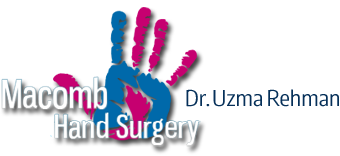Nerve Regeneration for Hand Injuries
Hand injuries and conditions that result in nerve damage can significantly impact a person’s quality of life. Nerves play a crucial role in transmitting signals between the brain and the muscles, enabling precise movements and coordination. Compromised nerve function can significantly impact the ability to use the hands effectively – affecting virtually every aspect of daily life.
Fortunately, ongoing research and advancements in the field of regenerative medicine have paved the way for innovative strategies to promote nerve regeneration and restore hand function.
In this article the Detroit area hand injury specialists at Macomb Hand Surgery explore several approaches that are being developed to enhance nerve healing, including the use of nerve grafts, nerve conduits, tissue engineering, and growth factors.
Nerve Grafts for Hand Injury
Nerve grafting is a well-established technique for bridging nerve gaps and facilitating nerve regeneration in the hand. In this procedure, the hand surgeon takes a segment of nerve tissue, called a nerve graft that is harvested from either the patient themselves (autograft) or from synthetic materials (allograft).
The nerve graft is then used to bridge the gap between the severed nerve ends, providing a scaffold for regenerating nerve fibers. Nerve grafts offer structural support for regenerating nerves and facilitate growth of the nerves across the injury site.
Autografts taken from the patient themselves provide a source of living cells, extracellular matrix, and growth factors that promote nerve regeneration. Allografts – synthetic nerve grafts – eliminate the need for donor sites and enable immediate graft availability.
Nerve Conduits for Hand Injury
Nerve conduits are tubular structures designed to bridge nerve gaps and guide regeneration of nerve cells across the injury site. They are often made of biocompatible materials (nontoxic products that the body doesn’t reject) such as synthetic polymers. However, the nerve conduits can also be created from collagen or decellularized nerve tissue
Nerve conduits provide a protective environment for nerve regeneration and can be combined with growth factors (below) to enhance their regenerative potential. Nerve conduits offer the advantage of eliminating the need for nerve graft harvesting, reducing time and the possibility of surgical complications.
When used in treating hand injury, nerve conduits can be tailored in terms of size and composition to optimize nerve regeneration outcomes in patients.
Tissue Engineering for Hand Injury
Tissue engineering can also be used to treat hand injury or disease. This procedure involves the development of a biocompatible matrix or ‘scaffolding’ that mimics the structure and function of the body’s nerve tissue. These scaffolds are often seeded with cells, such as stem cells, which promote nerve regeneration and provide a supportive environment for new nerves to grow.
Tissue-engineering offers a three-dimensional environment that works in the same way as the body’s nerve tissue. It can be tailored to specific patient needs, allowing customization for that individual patient.
Growth Factors for Hand Injury
The body’s own natural growth factors play a crucial role in promoting nerve regeneration by stimulating cell production and growth. Various growth factors, such as nerve growth factor (NGF), brain-derived neurotrophic factor (BDNF), and glial cell line-derived neurotrophic factor (GDNF), have shown promise in clinical studies for helping to repair and regenerate damaged nerves.
Growth factors can be delivered by the hand doctor to the injury site, providing a concentrated and targeted therapeutic effect. Hand injury doctors can combine the administration of growth factors with other strategies, such as nerve grafts or conduits, to further optimize nerve healing outcomes.
Top Hand Injury Doctor | Detroit Area
The development of these new strategies to promote nerve regeneration in hand injuries and conditions holds great promise for enabling hand doctors to restore hand function and improve patients’ quality of life.
When nerve function is compromised, whether due to injury, disease, or a medical condition, it can result in a range of symptoms that affect hand function and impact every aspect of daily life. This may include numbness or tingling sensations, weakness, loss of fine motor control, and difficulties with grip strength. Tasks that once seemed effortless, such as writing, typing, or buttoning a shirt, may become challenging or even impossible.
In addition to nerve regeneration, top Detroit area hand doctor Uzma Rehman, MD offers rehabilitation techniques, occupational therapy, and other medical interventions to improve hand function in individuals with compromised nerve function.
If you are suffering from an injury or pain in your fingers, wrist, elbow or arm, contact board certified Detroit area hand doctor Uzma Rehman, MD for a comprehensive evaluation and consultation. Doctor Rehman will assess your individual situation, and prescribe the treatments that are best for your condition.

